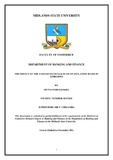Please use this identifier to cite or link to this item:
https://cris.library.msu.ac.zw//handle/11408/2220Full metadata record
| DC Field | Value | Language |
|---|---|---|
| dc.contributor.author | Munyawiri, Ezekiel | - |
| dc.date.accessioned | 2017-06-26T09:49:56Z | - |
| dc.date.available | 2017-06-26T09:49:56Z | - |
| dc.date.issued | 2014-11 | - |
| dc.identifier.uri | http://hdl.handle.net/11408/2220 | - |
| dc.description.abstract | The stability of every economy is measured by developments in the general price level of the economy. This depends on a number of factors among which are the exchange rates of a country’s currency and that of its major trading partners. This research seeks to establish the impact of the ZAR/USD exchange rates on inflation in Zimbabwe post dollarisation. Other objectives to this research are to determine how exchange rate movements influence import prices and hence inflation. The introduction of the multicurrency regime in 2009 brought about some life in the Zimbabwean economy that was ailing from hyperinflation. Industry had ceased to function to the extent that Zimbabweans depended on imports from the Republic of South Africa. With South Africa as the major trading partner, it would be natural that Zimbabwe adopted the ZAR as its main currency, being complemented by the USD and the BWP. That the government adopted the USD when more trade is conducted with South Africa exposed the economy to some exchange rate risk, which proved to influence the inflation in the country. Literature from various authors suggest that a negative relationship exists between exchange rates and inflation while a positive one is between expectations and inflation. From the findings, inflation in Zimbabwe post dollarisation is mainly influenced by the ZAR/USD exchange rates and expectations of economic agents. As a result, it is recommended that policies that encourage investment in the manufacturing sector be formulated and implemented in order to reduce the competitiveness of imports. It is also recommended that the ZAR be adopted as the main currency in order to reduce the economy’s exposure to exchange rate risk. | en_US |
| dc.language.iso | en | en_US |
| dc.publisher | Midlands State University | en_US |
| dc.subject | Exchange rate | en_US |
| dc.subject | Inflation rates | en_US |
| dc.title | The impact of the ZAR/USD exchange rate on inflation rates in Zimbabwe. | en_US |
| item.fulltext | With Fulltext | - |
| item.grantfulltext | open | - |
| item.languageiso639-1 | en | - |
| Appears in Collections: | Bachelor Of Commerce Banking And Finance Honours Degree | |
Files in This Item:
| File | Description | Size | Format | |
|---|---|---|---|---|
| MUNYAWIRI EZEKIEL.pdf | Full text | 854.49 kB | Adobe PDF |  View/Open |
Page view(s)
328
checked on Apr 4, 2025
Download(s)
232
checked on Apr 4, 2025
Google ScholarTM
Check
Items in MSUIR are protected by copyright, with all rights reserved, unless otherwise indicated.



